
Saudi ARAMCO World published a nice article on films about the Middle East by Suzanne Simons in its May/June 2010 issue, which can be read online.

Saudi ARAMCO World published a nice article on films about the Middle East by Suzanne Simons in its May/June 2010 issue, which can be read online.
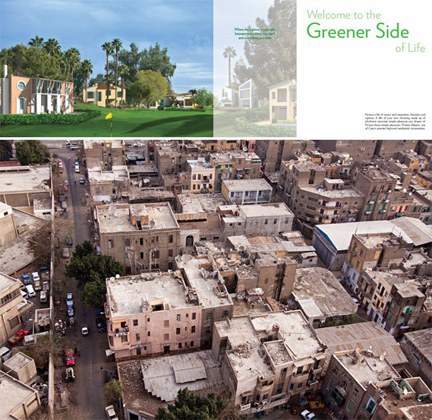
Top: Promotional image for Allegria, a gated community in Sheikh Zayed City, a suburb of Cairo, Egypt. [Image by SODIC] Bottom: Neighborhood in Cairo. [Photo by Brandon Atkinson]
by Karen Piper, The Design Observer Group, July 12, 2012
“Welcome to the Greener Side of Life” beckoned the billboard on Cairo’s Ring Road, which showed a man in a jaunty hat teeing off on a verdant golf course flowing into the horizon. I was stuck in traffic, breathing that mix of Saharan dust and pollution also known as “air,†so I could see the appeal. Somewhere outside the city, in a gated community called Allegria — Italian for “cheerfulness†— a greener life awaited. “Over 80% of Allegria’s land is dedicated to green and public spaces,” boasts the developer’s brochure, “meaning you’ll never lose the peace and tranquility which goes hand in hand with outdoor living.â€
It was a scorching hot summer, several months before the Egyptian revolution. Beneath the expressway sprawled the informal settlements where an estimated 60 percent of metropolitan Cairo’s 18 million residents live. [1] Some were using billboard poles to keep the brick structures from collapsing. Many did not have running water, and those who did found the taps drying up as water was diverted to the lavishly landscaped suburban developments with names like Allegria, Dreamland, Beverly Hills, Swan Lake, Utopia — a diversion that was straining the capacity of state-run water distribution networks and waste treatment plants. [2] Continue reading Revolution of the Thirsty

Traditional Ramadan Lanterns displayed on Egyptian streets
by Karim Adel, Open Democracy, 23 July 2012
It’s safe to say Uncle Ramadan is not going to sleep while he’s with us this year…
Uncle Ramadan is back and to Egyptians he’s back after what seems like a long while…
Although it’s an annual event this is the first time in two years that we celebrate without any turmoil and under a civil president… so it’s just safe to say Uncle Ramadan is not going to sleep while he’s with us this year…
Tunis Traditional Ramadan Lanterns displayed on Egyptian streets
You can see him walking down the old ancient alleys in the Al Hussein area in Islamic Cairo making sure all the colourful lights are hung well from building to building, he’s making sure all the giant colourful [12] lanterns [13] are hanging on every balcony…
He’s passing from home to home to make sure everyone, poor or rich gets a chance to eat after sun set…
He makes sure all those who have money have gathered some to give out to the poor and that every area and street has at least one charity group meal, set up for the poor and homeless every day of the 30 days of fasting… Continue reading Uncle Ramadan is back
The Pew Foundation has recently released a report entitled Most Muslims Want Democracy, Personal Freedoms, and Islam in Political Life on July 10, 2012. Click here to read the overview and gain access to a free pdf of the full report.
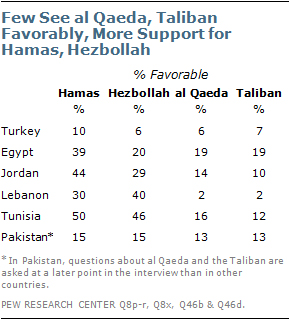
Here is what they say about Muslims views of extremists…
“Extremist groups are largely rejected in predominantly Muslim nations, although significant numbers do express support for radical groups in several countries. For instance, while there is no country in which a majority holds a favorable opinion of the Palestinian organization Hamas, it receives considerable support in Tunisia, Jordan and Egypt.
The militant Lebanese Shia group Hezbollah receives its highest overall ratings in Tunisia, where nearly half express a positive opinion. Sizable minorities in both Jordan and Egypt also have a favorable view, but Hezbollah’s image has been declining in both countries in recent years. In its home country, views about Hezbollah are sharply divided along sectarian lines: 94% of Shia, 33% of Christians, and 5% of Sunnis give the group favorable marks.
Across all six nations, less than 20% have a positive opinion about al Qaeda or the Taliban. In Turkey and Lebanon, support for these groups is in the single digits. However, fully 19% of Egyptians rate these extremist organizations favorably.”

Sheikh Wanis and his fellow adulterers
Al-Ahram has published an account of a salacious encounter of an Egyptian Salafi who is a former MP.
Egyptian authorities have decided to put on trial a Salafist ex-MP who was caught allegedly performing an “indecent” sexual act with a woman in public, a judicial source said on Thursday.
Ali Wanis’s trial is set for Sunday and will take place on time although he has gone missing since police found him last month engaged in a sexual act with a 22-year-old woman in a car parked on a highway.
The woman, a university student, is behind bars and the public prosecutor’s office has ordered the arrest of Wanis, a cleric and former MP for the ultra-conservative Al-Nour party.
After the incident in early June, Wanis denied any wrongdoing and said in a video posted on his website that he had parked along the side of the road because his passenger “became sick.”
But the pair have been accused of performing an “indecent” sexual act in public.
Al-Nour party, won the second largest number of seats in parliamentary elections last winter after the Muslim Brotherhood.
It was hit with a scandal in March when another lawmaker was forced to resign from parliament and from his party after claiming he was injured in a carjacking — to explain bandages on his face — when in fact he had had a nose job.
Wow — a blow job and a nose job and the appeal of Salafism takes a nose dive. Continue reading A Salacious Salafi
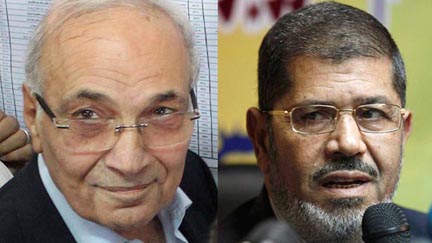
Can the Brotherhood revitalize Egypt’s economy? This is the relevant question. An Islamic state in the image of Iran (which is not likely to happen unless the Fatimids regain power in Cairo) would not solve the problem of jobs. Egypt relies heavily on its greatest natural resource, apart from its people: an extraordinary history that the world adores and invites tourism. Tourists will only flock to Egypt if it is a safe environment with plenty of liquor flowing in the major hotels. Despite the number of veiled women in the streets, this is after all the country that Nasser built. Socialism may be passé, but the world that Umm Kulthum sang about lives on and this is not one that was around in the 7th century.
Much has been written about the Brotherhood, both pro and con. Apart from partisan Islamophobes, it is clear that Morsi is not Mullah Umar of the Taliban. If you were to poll Egyptians about the desire to see all statues of Ramses blown up, as happened to the Bamiyan Buddhas, I doubt you would find many who would applaud such an absurd idea. Islam is the dominant religion in Egypt, but the Pharaohs still reign in Egyptian hearts. To the extent that Egyptians view their cultural origins as Umm al-Dunya, they are not about to do in their mother. The Pyramids have survived for some five millennia, before Judaism, Christianity or Islam. They are more than likely to survive all three of these major monotheisms in their present form.
Time is twittering away, at least for me on a picture-perfect weather Sunday morning in New York. The hour of 3 pm in Cairo (9 am EST) has come and gone, but ma’a laysh. Inshallah the results will be out soon. Meanwhile, while browsing the Arabic edition of Al-Ahram, I see the picture (below) of Morsi.
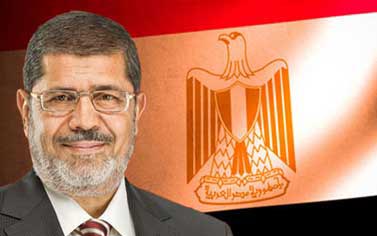
And the winner is … Morsi!
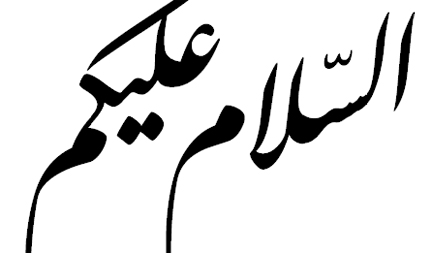
The epitome of Arabic greetings is salam alaykum, peace be upon you, but it seems that the Middle East harbors more harb (war) than peace these days. It can be argued that this is hardly new for a region that has seen more warfare over time than any other. Perhaps the characterization of the region as the Holy Land has as much to do with the amount of human blood spilled on its soil as for the number of prophets preaching peace. But today’s news cycle is particularly sad because nowhere does there seem to be much hope for furthering the peace that most people are dying to achieve. The violence drones on and on.
As former President Mubarak lies in a coma, many Egyptians are once again flooding Tahrir Square to contest the military’s coup-like takeover of political power, although perhaps it should be styled a makeover, since they have held de facto power all along and will continue to do so no matter who is elected. To Egypt’s south far less individuals took to the streets in Khartoum, protesting the Sudanese government. Although Somalia has been pushed out of the major news cycle, the situation there remains as volatile as ever. Crossing over into Sinai, an Israeli construction worker was killed a few days ago and in the escalating tension Hamas has fired rockets at Israel and Israel has launched air raids in Gaza. Syrian violence continues but without the pretense of powerless monitors and the repaired helicopters that were being shipped from Russia. In Iraq pilgrims continue to be targets of bombs and pay for their devotion with their lives. In Yemen the military commander of the brigade that drove Ansar al-Sharia out of their southern base was killed earlier in the week by a suicide bomber. Even in Turkey there has been recent violence from Kurdish nationalists.
Long ago one of the prophets in this region said the immortal words: Blessed are the peacemakers. But how can they be blessed if they are absent? Why does the curse of the warmakers seem to outweigh efforts at peace? If Indeed we recently witnessed an “Arab Spring,” the reality is that spring is part of a seasonal cycle and not eternal. The “fall” of dictatorial regimes is still playing out, but the cold sectarian winds blowing out hopes for peace and the frosted rhetoric of intolerance do not bode well for the tender blossoming of sought freedoms. The region needs a Gandhi, not an Osama or an Assad. The region needs a salam dunk, not a harb to the right. But, if history is any gauge, there will still be no blessings to confer in tomorrow’s news cycle.

The polling is over in Egypt, but the dust has not yet settled. Given the simoon of recent political events, it is not likely to settle soon. Unofficial tallies place the Muslim Brotherhood backed candidate, Mohammed Morsi, with the lead. But the official results will not be released until June 21. Yet, it is possible to ask if there can be any real winner, since the ruling military council has ensured that it will continue to call the shots and ride oversight on any new government. The stage is now set for either a confrontation between supporters of the Brotherhood and the military or a marriage of convenience. I suspect the latter. The military is not about to lose power, not has it gambled away its prestige by engaging in ruthless slaughter as has happened in Syria.
Egypt, as most people know even if they only read their King James Bible, has a long history. Relics of the pharaohs dot the landscape; the pharaohs were gods on earth, the absolute dictators of their day, and they generally got along fine with the religious framers. When Akhenaten tried to go against the grains of the gods and call for the worship of one God, Aten, it was a short-lived moment. The rulers in the Islamic era were also not on the side of democracy. When the Mamluks, foreign mercenaries who wreaked havoc on the locals, took over in the 13th century, they played the religion game and adopted devout-sounding names, but their lust was for power and revenues and not to glorify Allah. It is tempting to view the continuing role of Egypt’s military as a Mamluk ploy, only from within. The military today is thoroughly Egyptian and has vast economic assets as well as the ability to channel politics. Continue reading And the winner is?